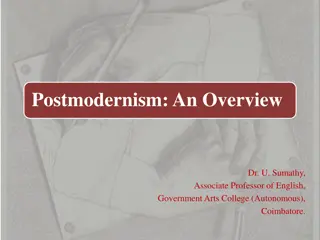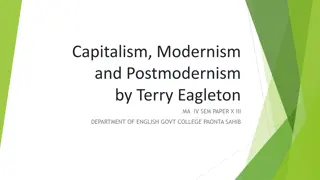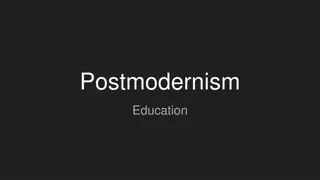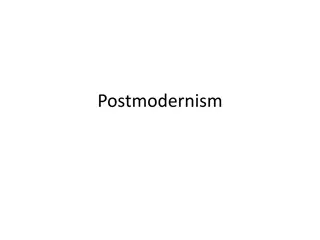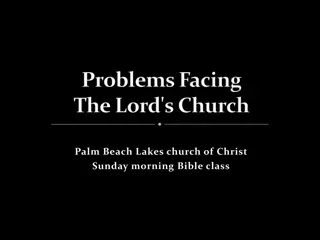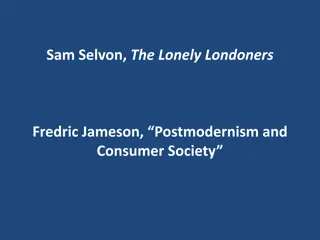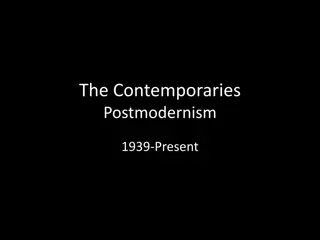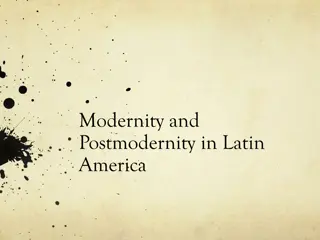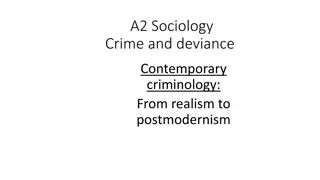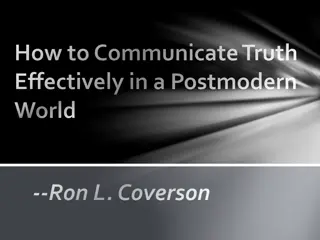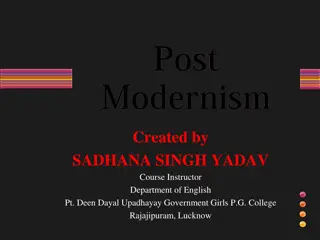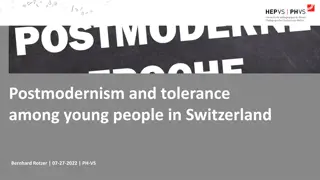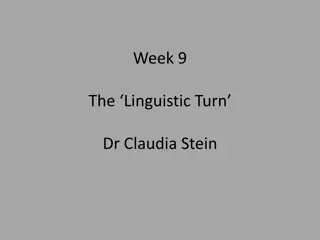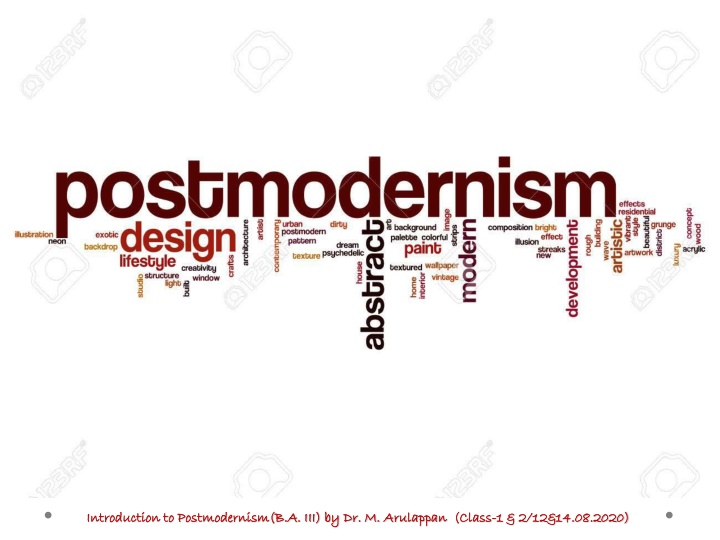
Postmodernism Through Dr. M. Arulappan's Introduction
Explore the concept of postmodernism as a reaction against modernism, characterized by scepticism and anti-foundationalism. Dr. M. Arulappan delves into the cultural shifts and philosophical implications of postmodern thought in this insightful introduction.
Download Presentation

Please find below an Image/Link to download the presentation.
The content on the website is provided AS IS for your information and personal use only. It may not be sold, licensed, or shared on other websites without obtaining consent from the author. If you encounter any issues during the download, it is possible that the publisher has removed the file from their server.
You are allowed to download the files provided on this website for personal or commercial use, subject to the condition that they are used lawfully. All files are the property of their respective owners.
The content on the website is provided AS IS for your information and personal use only. It may not be sold, licensed, or shared on other websites without obtaining consent from the author.
E N D
Presentation Transcript
Introduction to Postmodernism(B.A. III) by Dr. M. Introduction to Postmodernism(B.A. III) by Dr. M. Arulappan Arulappan (Class (Class- -1 & 2/12&14.08.2020) 1 & 2/12&14.08.2020)
Introduction Introduction - - 1 1 Postmodernism is a reaction against modernism. Postmodernism brought about by the disillusionment followed by the Second World War. Postmodernism is to be regarded as a rejection of many of the cultural certainties on which life in the West has been structured over the last couple of centuries. Postmodernism has questioned our commitment to cultural 'progress' (that economies must continue to grow, the quality of life to keep improving indefinitely, etc.), as well as the political systems that have underpinned this belief. Introduction to Postmodernism(B.A. III) by Dr. M. Introduction to Postmodernism(B.A. III) by Dr. M. Arulappan Arulappan
Introduction Introduction - - 2 2 It is easier to give an account of what postmodernism is not, rather than positively articulating what it is. Postmodernism is not just a philosophical school or system. But refers to various developments that happened in culture in general and particularly in the realms of literature, film, architecture, art etc. Its negative features: it is characterized by scepticism, anti-foundationalism and a dislike of authority. It radically questions the Enlightenment project and its associated notions of progress and emancipation based on reason. In this sense, it can be conceived as a reaction to modernism. Introduction to Postmodernism(B.A. III) by Dr. M. Introduction to Postmodernism(B.A. III) by Dr. M. Arulappan Arulappan
Modernism Modernism - - 1 1 Modernism is associated with capitalism and rationalism. Modernism is also associated Historic period: 1870s 1945 / 1910 1939. A state of mind: rejection of traditional such as philosophy / moral / artistic Thrust for new / novelty / originality Loss of faith in religion & ideologies Ideologies were breaking down such as religious / political / economical / social Cultural dissolution of moral Before modernism World was ruled by monarchs / Kings / Queens / Popes. Introduction to Postmodernism(B.A. III) by Dr. M. Introduction to Postmodernism(B.A. III) by Dr. M. Arulappan Arulappan
Modernism Modernism - - 2 2 Modernism is post-industrial revolution. Therefore modernism was belief in progress through science, research and discoveries. Due to technological development Lower class or middle class / general public received knowledge of more abstract and concepts. Therefore Philosophy became wide spread among people. Changes in life standard / progress in life took place. Organisations / societies were becoming more organised. History was put into place / World was mapped. Everything was institutionalized. Rationalisation led to the idea of how society was / how it is to be operated. Introduction to Postmodernism(B.A. III) by Dr. M. Introduction to Postmodernism(B.A. III) by Dr. M. Arulappan Arulappan
Modernism Modernism - - 3 3 Modernism emphasized on: Liberty - Progression Freedom - Constitutional Governments came up Tolerance - Separation of church & state Modernism gave raise age of reasoning & logic led to rejection of metaphysics as unproved. Rejection Feudalism / religion / rather believing in science & Objective truth Not only secularism came up but also atheism. No longer people identified with religion rather identified themselves with nationalism / patriotism / capitalism / communism. Introduction to Postmodernism(B.A. III) by Dr. M. Introduction to Postmodernism(B.A. III) by Dr. M. Arulappan Arulappan
Postmodernism Postmodernism - - 1 1 Postmodernism Philosophical movement Method of philosophical thought Wants to view the world differently from modernism Evolved in mid 1960s Postmodernism = Post + Modernism 1. Continuation of modernism 2. Reaction / Response to modernism Famous postmodernist thinkers: Jean-Fran ois Lyotard Pierre-F lix Guattari Jean Baudrillard Fredric Jameson Jacques Derrida Gilles Deleuze Michel Foucault Introduction to Postmodernism(B.A. III) by Dr. M. Introduction to Postmodernism(B.A. III) by Dr. M. Arulappan Arulappan
Postmodernism Postmodernism - - 2 2 Introduction to Postmodernism(B.A. III) by Dr. M. Introduction to Postmodernism(B.A. III) by Dr. M. Arulappan Arulappan
Postmodernism Postmodernism - - 3 3 Postmodernism is a late 20th-century movement in philosophy and literary theory that generally questions the basic assumptions of Western philosophy in the modern period (roughly, the 17th century through the 19th century). Postmodern philosophy is characterized by broad skepticism or relativism and a general suspicion of reason. It also broadly asserts that Western intellectual and cultural norms and values are a product of or are in some sense influenced by the ideology of dominant or elite groups and at least indirectly serve their interests. Introduction to Postmodernism(B.A. III) by Dr. M. Introduction to Postmodernism(B.A. III) by Dr. M. Arulappan Arulappan
Characteristics of Postmodernism Characteristics of Postmodernism - - 1 1 Disillusionment Disillusionment with with modernist modernist thinking thinking: : Postmodernists are uncomfortable with the modernist s failure in achieving peace and progress in society. Therefore, they challenge the conventional way of operating. Opposition Opposition to to traditional traditional authority authority: : Overall, authority is dangerous and not to be trusted. Authority figures are to be opposed due to their loyalty to the establishment and rigid beliefs in moral truths. Facts Facts are are useless useless: : Facts can change daily or they may be utter lies. This comes with believing that truth is subjective and that it s something that shouldn t be generally acknowledged. Introduction to Postmodernism(B.A. III) by Dr. M. Introduction to Postmodernism(B.A. III) by Dr. M. Arulappan Arulappan
Characteristics of Postmodernism Characteristics of Postmodernism - - 2 2 Truth Truth is is relative relative: : There are no impartial truths. They have been defined by people and groups who use them to obtain power. One individual s perception of reality doesn t always match another individual s perception of reality. For instance, even though you may view an individual of the opposite sexas in a relationship based on their apparently conventional practices that suggest that they re taken, they may not see themselves as in a relationship. Rationalization Rationalization: : Opinions are what matter in postmodern thinking. Provided that the opinion is rationalized, it can be accepted as the best explanation. This means that science is rejected for the reason that there is no objectivity. Introduction to Postmodernism(B.A. III) by Dr. M. Introduction to Postmodernism(B.A. III) by Dr. M. Arulappan Arulappan
Characteristics of Postmodernism Characteristics of Postmodernism - - 3 3 Morality Morality is is relative relative: : There isn t a moral system that s right for everyone. Traditional beliefs that have been accepted for hundreds of years fall by the wayside when people accept that truth is relative. This is where many Christians are at odds with postmodernists. Each Each religion religion is is legitimate legitimate: : Postmodern thinkers believe that there isn t one religion that s right. Instead, all of them are legitimate. If you subscribe to a faith based on personal experiences and it s compatible with you, then it s accepted by postmodern thinkers. Introduction to Postmodernism(B.A. III) by Dr. M. Introduction to Postmodernism(B.A. III) by Dr. M. Arulappan Arulappan
Characteristics of Postmodernism Characteristics of Postmodernism - - 4 4 Belief in in internationalism internationalism: : Postmodernists reject the idea of Belief nationalism for the reason that it drives nations into conflict with each other, discouraging healthy human progress. Internationalism ensures that we re looking out for the greater good, uniting instead of dividing. Collective Collective ownership ownership: : Postmodern thinkers disapprove of the idea of individual ownership. It would be most fair if we divided and distributed goods as a group. Equality Equality: : Postmodernists believe in equality for all, regardless of race, sexual orientation, class or religion. Therefore, there isn t one right way to live. Introduction to Postmodernism(B.A. III) by Dr. M. Introduction to Postmodernism(B.A. III) by Dr. M. Arulappan Arulappan
Summary of Postmodernism Summary of Postmodernism Many postmodernists hold one or more of the following views: there is no objective reality there is no scientific or historical truth / objective truth science and technology (and even reason and logic) are not vehicles of human progress but suspect instruments of established power reason and logic are not universally valid there is no such thing as human nature are socially determined or constructed language does not refer to a reality outside itself there is no certain knowledge no general theory of the natural or social world can be valid or true / all are illegitimate metanarratives .
Recap Recap
Contemporary Western Philosophy (M.A. II) by Dr. M. Arulappan
Postmodernism Postmodernism - - 1 1 Although some postmodernists reject the relativist label, many postmodern doctrines constitute or imply some form of relativism. Many postmodernists deny that there are aspects of reality that are objective or that there are statements about reality that are objectively true or false (implying metaphysical relativism), that it is possible to have knowledge of such statements (implying epistemological skepticism or relativism), and that there are objective, or absolute, moral truths or values (implying ethical subjectivism or relativism). Instead, reality, knowledge, and value are constructed by discourses (shared linguistic practices) and can vary with them. Introduction to Postmodernism(B.A. III) by Dr. M. Introduction to Postmodernism(B.A. III) by Dr. M. Arulappan Arulappan


